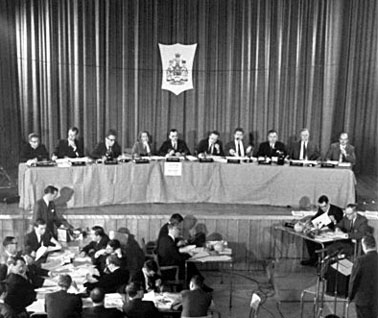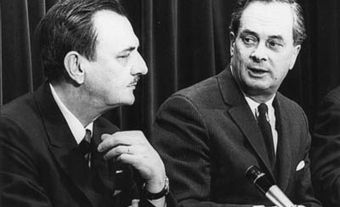
Details of the Official Languages Act (1969)
The Official Languages Act of 1969 had 39 sections. After its short title (section 1) and the declaration of English and French as the official languages of Canada for all purposes of the Parliament and Government of Canada (section 2), the Act goes on to describe the legal value of statutory and other instruments. It explains that all rules, orders, regulations, by-laws and proclamations that are required under any Act of the Parliament of Canada to be published in the official gazette of Canada must be made or issued and published in both official languages. The Act then sets out the limited circumstances in which there may be temporary exceptions to this general rule (sections 3 to 7).
The section of the Act on the construction of versions of enactments provides that, in construing an enactment, its versions in each of the official languages are equally authentic (section 8). The Act then describes the duties of departments and other government authorities in relation to official languages (sections 9 to 11). It moves on to a framework description of federal bilingual districts, setting out the basic conditions for establishing the districts in question but not specifically listing them (sections 12 to 18).
The Act then creates the office of Commissioner of Official Languages, describing it in detail and setting out the Commissioner’s role, powers, status and salary, as well as the limits on the Commissioner’s term of office. A senior public servant, the Commissioner has the same legal status as a “deputy head of a department.” Special attention is paid to describing the procedure by which citizens may make complaints to the Commissioner regarding the application of the Act, and to the manner in which the Commissioner is to investigate those complaints and make recommendations (sections 19 to 35).
The interpretation section of the Act then defines a number of concepts (e.g., “Crown corporation,” “court of record,” “National Capital Region,” “enactment,” “mother tongue” and “institution of Parliament”). The omnibus nature of the Act can also be seen here, in that the concept of “official languages of Canada” is defined for the purposes of all other previous enactments of the Parliament of Canada. Finally, the Act stipulates that none of its provisions should be construed as affecting the customary status acquired by any language that is not an official language of Canada (sections 35 to 38).
One of the final sections, on orderly adaptation to the Act, provides that the governor in council may, by order, defer or suspend the application of provisions of the Act if certain conditions are met. The Act also stipulates how the appointment and advancement in employment of personnel in the public service of Canada are gradually to be brought into line with the Official Languages Act (section 39).
Viability of the Official Languages Act of 1969
While all of the federal political parties supported the Official Languages Act when it was introduced, the provincial response was much more tepid. New Brunswick passed its own Official Languages Act in 1969, introducing official bilingualism, while Ontario settled for providing French-language services in limited areas on an ad hoc basis. In 1979, 10 years after the federal Official Languages Act was passed, the Supreme Court of Canada found that Manitoba, which had officially been a monolingual anglophone province since 1890, had to comply.
In 1988, the Official Languages Act of 1969 was repealed and replaced with a new Official Languages Act, mainly to promote the official rights of linguistic minorities in accordance with the most recent developments in Canadian language policy.

 Share on Facebook
Share on Facebook Share on X
Share on X Share by Email
Share by Email Share on Google Classroom
Share on Google Classroom

